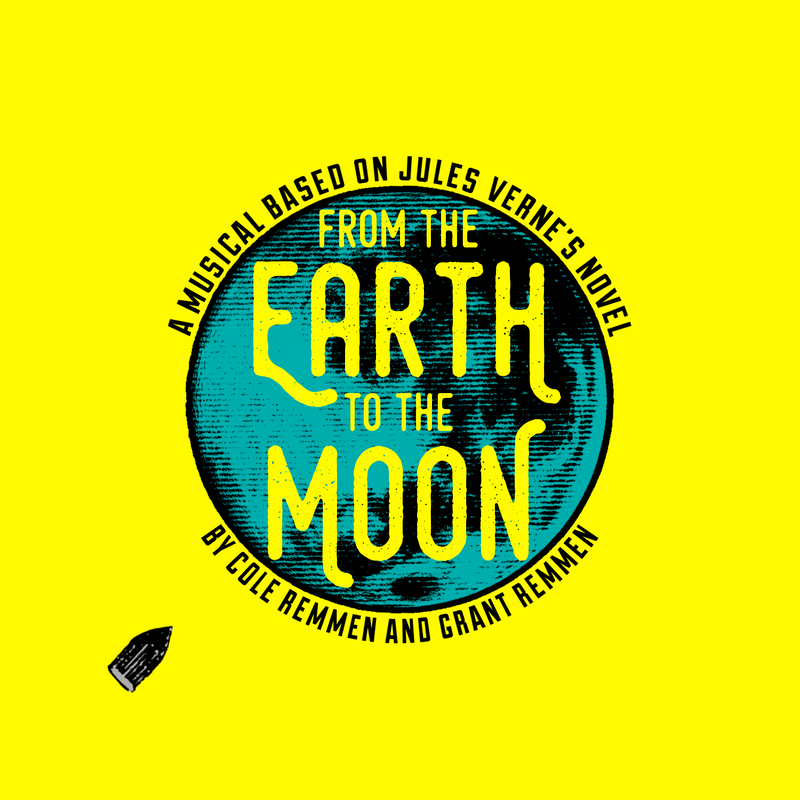|
PREMIERED AT CALTECH IN 2022
28 original songs:
|
From the Earth to the Moonby Cole Remmen and Grant Remmen
based on Jules Verne's classic novel America, 1865. The Civil War has ended, and the Union artillery designers and scientists of the Baltimore Gun Club who led the North to victory are in search of a new endeavor. Idiosyncratic and lovable inventor J.T. Maston invites us on the grandest voyage in human history. Maston’s best friend, the brilliant engineer Captain Barbicane, proposes an audacious new undertaking: to build a colossal cannon and use it to launch the first projectile to the Moon! The audience is whisked along on the friends’ journey, following the daring mission from its inception, through its challenges, triumphs, dangers, and exciting conclusion. Along the way, we meet Phoebe Penrose, the intrepid and tenacious reporter who falls in and out of love with Maston while championing the rights of the free press. Meanwhile, Barbicane contends with a ghost from his past in the form of Captain Nicholl, his melodramatic archnemesis who wagers against the project, trying to sabotage it. Suddenly, the Club is thrown into chaos by the arrival of a mysterious French adventuress, Michelle Ardan, who proposes to travel to the Moon in the projectile. Gauntlets are thrown, headlines made, duels waged, and alliances put to the test. From the Earth to the Moon is a combustible and dynamic tale, set to vibrant, electrifying music that captures the wonder of Jules Verne’s extraordinary voyages.
Writing in the latter half of the nineteenth century, French author Jules Verne is regarded as the father of science fiction. His works, such as Twenty Thousand Leagues under the Sea, Journey to the Center of the Earth, Around the World in Eighty Days, From the Earth to the Moon, and more, are legendary for their imaginative and captivating storytelling, but also for their visionary anticipation of many technologies that came to fruition in the ensuing decades, including submarines and electric lighting, as well as the lunar mission launching site and splashdown. From the Earth to the Moon is Verne’s best-known novel to take place in the United States and showcases his unique intellect and razor-sharp wit in imagining a manned lunar mission in the late 1800s. All the while, Verne offers compelling commentary on the character of the American psyche that is as relevant today as it was more than a century ago. The years 1865-1866 in the United States were a time of dramatic contrasts, tumultuous change, and profound uncertainty, but also of hope and possibilities. After the horrors of the Civil War, the country had defeated the evil of slavery and was beginning the process of reuniting, aiming to strive towards a more perfect union. While the Reconstruction period in the real world did not play out completely as intended, with the full realization of civil rights for all delayed another century or more, From the Earth to the Moon takes place in a more hopeful timeline, a possible world that might have been. Writing the original book in this same period, Verne looked across the Atlantic to America and saw its promise and opportunity for all people, with limits set not by its past or by prejudices, but only by its imagination and ingenuity in building a better future. In that spirit, in imagining what 1865 could be, this explosive musical adaptation of From the Earth to the Moon encourages us to turn our eyes and our efforts to creating a brighter tomorrow for us all. It is a story of timeless ideals, applied in the unique and timely setting of technological problem-solving. It is a tale of both the power and pitfalls of ambition, of the strength of friendship and of reconciliation, of the trials of love, of passion for truth and knowledge, and of the eternal human need to go beyond the confines of the present, to break the bounds of the possible, and to reach for the stars. |

